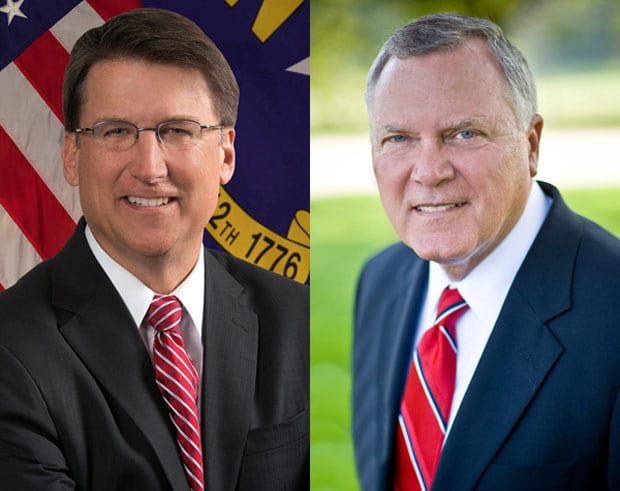Lisa Keen | Keen News Service
lisakeen@mac.com
Lambda Legal and the ACLU announced Monday they are filing a lawsuit to challenge the constitutionality of a law passed by North Carolina last week to prevent local governments from protecting LGBT people against discrimination.
The announcement came the same day that Georgia Gov. Nathan Deal announced that he will veto House Bill 757, a so-called “religious freedom bill” passed earlier this month by the Georgia Assembly. HB 757 would have allowed religious officials to refuse to perform “marriage ceremonies in violation of their legal right to free exercise of religion.”
The North Carolina law also prohibits transgender people from using a public restroom for the gender they are living, is one of two anti-gay measures under consideration by several other states.
The state’s Republican governor, Pat McCrory, on March 23 signed the two-punch law that effectively bars transgender people from using public restrooms that match their gender identity and bars any local government from having an ordinance that prohibits discrimination based on sexual orientation and gender identity.
Kansas’ Republican Gov. Sam Brownback on March 22 signed a bill that prohibits colleges and universities from denying to any “religious student association” any benefit available to other student groups because the religious group requires members to “comply with the association’s sincerely held religious beliefs” and “standards of conduct.”
The North Carolina law drew the most media attention and response, going to a new extreme to limit the civil rights of LGBT people. The National Basketball Association and the National Collegiate Athletic Association have both issued statements saying the state’s new law might prompt them to withdraw upcoming major events from Charlotte. Carolina’s National Hockey League team issued a statement saying it is “devoted to providing a welcoming and respectful environment for all fans.”
American Airlines, which has a hub in Charlotte, said, “Laws that allow such discrimination go against our fundamental belief of equality and are bad for the economies of the states in which they are enacted.” Even the mayor of San Francisco has banned city employees from any publicly funded travel to North Carolina on city business.
Lambda Legal, the ACLU, and Equality North Carolina issued a press release Sunday night, March 27,saying they would challenge the law in federal court.
The Carolina law requires that all public schools facilities have bathrooms or changing facilities “designated for and used only by students based on their biological sex.” Biological sex is defined by what gender is indicated on a person’s birth certificate.
It also declares that state law concerning “discriminatory practices” will “supersede and pre-empt any ordinance” or regulation of any local government. North Carolina state law does not prohibit discrimination based on sexual orientation or gender identity.
“This outrageous new law not only strips away the ability of local jurisdictions to protect LGBT people from discrimination, but it goes further and targets transgender students who deserve to be treated equally at school — not harassed and excluded,” said Human Rights Campaign President Chad Griffin.
McCrory allowed the state legislature to hold a special session just to consider the measure, aimed specifically at an ordinance approved by the Charlotte City Council in February. The city sought to prohibit discrimination based on their gender identity. But the new state law, “Public Facilities Privacy and Security Act,” prohibits any local government from passing non-discrimination ordinances.
HRC said legislators had only five minutes to review the bill before voting on it and that Democrats in the Senate walked out, rather than vote on the measure.
In a statement released Wednesday, McCrory called Charlotte’s ordinance a “radical breach of trust and security under the false argument of equal access” and said it endangered the “basic expectation of privacy in the most personal of settings, a restroom or locker room.”
Mara Keisling, executive director of the National Center for Transgender Equality, said 76 percent of transgender people do not have an updated birth certificate. Jenny Pizer, law and policy director for Lambda Legal, said the law makes it impossible for transgender people to stay in school, hold jobs or access public services because “as a practical and safety matter” they are barred from using bathroom facilities.
The legislature’s debate echoed remarks heard frequently during the recent battle over a non-discrimination ordinance in Houston, where a referendum overturned the city’s non-discrimination law, HERO, which prohibited numerous categories of discrimination, including race, religion, sexual orientation, and gender identity.
But in Houston, the referendum simply repealed the ordinance. In North Carolina, the new law repeals all existing local ordinances that prohibit sexual orientation and gender identity discrimination and forecloses any future local ordinances.
According to HRC, North Carolina is the first state “to enact such a law attacking transgender students.” Kansas is bucking to be next. Kansas legislators on March 16 introduced bills to the House and Senate that call for all public schools to label restrooms by gender and enables students who encounter “a person of the opposite sex” in their restroom or locker to sue the school for $2,500 for “each instance” and monetary damages for “all psychological, emotional, and physical harm suffered.”
Earlier this month, South Dakota’s Republican governor, Dennis Daugaard, vetoed a bill similar to North Carolina’s, though it required transgender people to use “single-occupancy” restrooms or locker rooms.
But a number of states are still considering such legislation. The Illinois legislature has a similar bill pending before a House committee. Other states considering laws relating to gender identity and/or religious justifications for discrimination against LGBT people include Indiana, Mississippi, Missouri, Oklahoma, Washington and Wisconsin.
Two bills seeking to limit use of public bathrooms by transgender people failed in the Virginia legislature last month, including one that sought to fine students $50 if they used the wrong bathroom.
Similar bills died in Kentucky and Tennessee.
Massachusetts is considering a pro-trans bill; to provide “equal access to public places regardless of gender identity.”
© 2016 Keen News Service. All rights reserved.

















